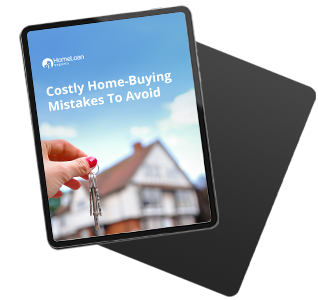If you need help with getting a home loan, call 1300 889 743 or complete our free assessment form to speak with one of our mortgage brokers.
What are the costs of buying a property?
When you buy a property, you can expect to spend up to 5% of the contract price on fees, duties and charges. So for a purchase of $500,000, there may be up to $25,000 of costs involved in order to complete the purchase.
The main government fees associated with buying a home are:
- Purchase stamp duty: This is the largest expense. It’s a tax levied by your state government on all property purchases.
- Mortgage stamp duty: This is a tax levied by the state government based on the size of your mortgage. It has now been abolished in most states.
- Transfer fee: This is a government fee for registering your name on the title of the property and removing the vendor’s name.
- Registration fees: This is a government fee for registering your lender’s mortgage on the title of your property. If the vendor has a mortgage on the property then you may be charged to remove their mortgage, the cost of which will be reimbursed by the vendor at settlement.
Enter your details in the purchasing costs calculator and you’ll get an idea of the government fees that will apply.
If you’re a first home buyer, buying a new property or building a home, you may be eligible for additional concessions or grants. Please contact your state government office for confirmation.
Alternatively, you may also qualify for the First Home Loan Deposit Scheme if you’re a first home buyer.
8 Costly Home-Buying Mistakes To Avoid

Disclaimer: Over the next few days, you’ll receive additional guides to help you on your homebuying journey. Occasionally, you’ll receive carefully curated home-buying tips, offers & schemes, and news articles. You can unsubscribe any time you want. View our Privacy Policy
What Are The Other Hidden Costs Of Buying A House?
There are a range of additional costs which aren’t included in this calculator:
- Conveyancing costs: You’ll need to hire a conveyancer or solicitor to handle the transfer of the property into your name. This will cost approximately $800 to $1,500.
- Inspections / Reports: You may need a building inspection, pest inspection and a strata report. These can cost up to $600 in total. Please discuss these reports with your conveyancer to see if they are required.
- Loan fees: Some lenders charge an application fee, settlement fee or valuation fee. These fees vary from $0 to $900.
- Lenders Mortgage Insurance (LMI): If you’re borrowing over 80% of the property value then you may pay LMI. Please use our LMI Calculator to get a quote.
There may be other costs such as repairs to the property, renovations, hiring a removalist and council / council/water adjustments. You should discuss the costs of buying a property with your conveyancer.
Note that you’ll have to pay a range of different costs when selling property too.
Did you know some of our lenders offerpurchase cash backs for property buyers? This can help you offset some of the costs of purchasing a property and in some cases, you can even pocket some money.
Get An Overview Of Your Home Loan, Fast!
The 360° Home Loan Assessor helps you understand every aspect of your home loan in minutes. Calculate deposits, review costs, and explore loan options, all in one place.
TRY IT NOW| The True Cost of buying and owning a house | |
|---|---|
| Property price | $600,000 |
| Home loan details | $540,000 @4% p.a |
| Initial one-off purchasing costs | |
| Transfer Registration | $143.50 |
| Stamp duty | $0.00 (Stamp duty is waived up to a certain price threshold for first-time buyers) |
| Total | $143.50 |
| Home loan set up fees | |
| Mortgage Registration | $143.50 |
| Loan establishment fees | $1,000 |
| Settlement fee | $1,000 |
| Lenders Mortgage Insurance fee | $14,301 |
| Total | $16,444.50 |
| One-off property costs | |
| Valuation fee | $300 |
| Conveyancing fee | $1,200 |
| Removalist Costs | $1,000 |
| Building Inspection Report | $300 |
| Pest Inspection Report | $150 |
| Connecting phone, cable and internet | $100 |
| Total | $3,050 |
| Yearly Property Maintenance and Mortgage Costs | |
| Mortgage Repayments | $30,936/year ($2,578 x 12 monthly repayments) |
| Content Insurance | $100 |
| Strata fees/body corporate (i.e. building insurance, garden maintenance) | $2,000/year |
| Council Rates | $500 |
| Water Rates | $500 |
| Total | $34,036 |
| Total Costs of Home Ownership Year 1 | $53,674 |
Why do lenders assess my 'Funds to Complete'?
When you apply for a loan, the lender may ask for evidence of your deposit and won’t approve your loan unless you can prove that you have enough funds to cover the costs, as well as the difference between the purchase price and loan amount. This is known as a Funds to Complete Calculation.
They do this check because if there’s a shortfall of funds, some people end up taking out a short term loan or credit card to make up the difference. This additional loan can then impact their ability to repay their mortgage.
Access more calculators
Talk to a Home Loan Experts mortgage broker to find out the true costs of buying a home. Call us on 1300 889 743 or complete our free assessment form.
